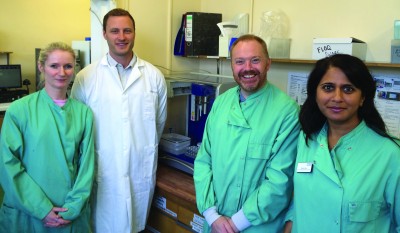
Having food poisoning is not a nice experience but a new test introduced at Sandwell and West Birmingham Hospitals NHS Trust is helping to speed-up patients’ diagnosis.
The new test being carried out by staff in the Microbiology Department at City Hospital, breaks away from traditional techniques which have been in use for many years and uses innovative technology to reduce result times from days to just a few hours.
The Microbiology Department at City Hospital is first in the Midlands to use this new technology.
The ‘EntericBio’ investigation utilises the latest gene-probe molecular science testing a number of common food poisoning organisms, including Salmonella, Shigella, Campylobacter and E.coli by Polymerase Chain Reaction (PCR).
This identifies a gene sequence specific to a target bacteria and, if it is present, amplifies it many thousands of times until a measurable reaction is obtained.
By this means a preliminary positive or a negative result can be obtained the same day, as opposed to using traditional bacterial culture techniques which can take up to 48 hours.
This means that many patients can move out of side rooms much more quickly than is currently the case, freeing-up isolation beds for other patients who need them.
Project leader Nathan Reading, Senior Biomedical Scientist, explained: “The form of technology employed is becoming increasingly common within medical microbiology, whereby specific gene sequences are used to accurately identify named bacteria.
“Previously, most microbiology involved culture techniques, the basics of which date back well over a century and almost inevitably require at least overnight incubation.
“Using PCR, turnaround times can be massively reduced and results delivered to relevant healthcare professions on the same day.
“The Microbiology Department at SWBH already utilises a number of PCR techniques and is actively engaged in further innovations involving this useful technique which, within the laboratory itself and across the wider healthcare economy, offers both financial savings and healthcare pathway improvements.”

